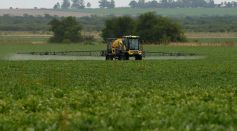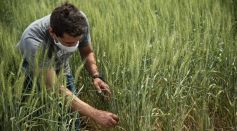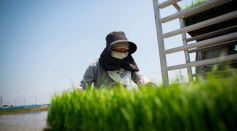Tags: Agriculture

Human Urine a Safe, Natural Alternative to Artificial Fertilizers to Help Feed Growing Population

Genetically Modified Crops: Nanocarrier Spray Helps Achieve Better Plants

Ozone Pollution Impacts Crops on East Asia, Results to 63 Billion Dollars Annual Loss

More Microplastics in Soil Threatens Agriculture and Human Health

MIT Researchers Explore How Marsh Grass Provide Protection From Devastating Storm Surges Along the Shorelines

Human-Induced Methane Emissions Contribute to Greenhouse Gases; Agriculture, Livestock, Gas, and Coal Are Primary Culprits

Farm Robots: Ecological Future or Impending Disaster?

Butterflies Endangered: How Too Much Nitrogen Risks Them in Switzerland

Local Vietnam Rice Genomes Improve Crop Resilience, Withstands Climate Change

Beer Waste Plus Manure Makes Safer, Greener Pesticides

Yuan Longping, the "Father of Hybrid Rice," Dies at 90; Here's How He Changed the World
Biosolids From Sewage Water Could Solve Global Carbon Emissions and Power Shortages
Venus Flytrap Robo-Plants Enables Farmers to Determine Problems With Crops at Early Stage

Pesticides Place 31% of Global Agricultural Land at Risk, Study Says
Biodegradable Farming Alternatives May Answer Call to Resolve Plastic Content in Food

Researchers "Switched Off" This Chemical To Help Roots Penetrate Compact Soil

Exploring Nonhost Resistance, or Why Pathogens Choose Which Plants to Harm

Scientists Call for Change in Eating Habits Before 20,000 Species Face Serious Impact

Space Agriculture Breakthrough as Method Found for Turning Urine to Fertilizer
What Are Colloids and Why Are They Important?
Most Popular

Ancient Hotspot Found to Have Created Great Lakes 300 Million Years Ago

Mysterious Structures Discovered Beneath the Pacific Ocean, Puzzle Scientists

Health Benefits of Drinking Hot Chocolate

Largest Known Volcanic Aquifer Discovered Beneath Oregon's Cascades





